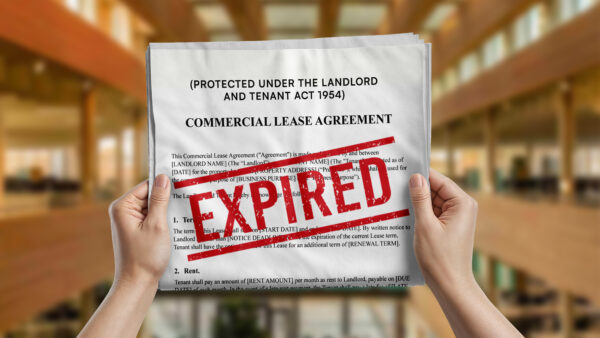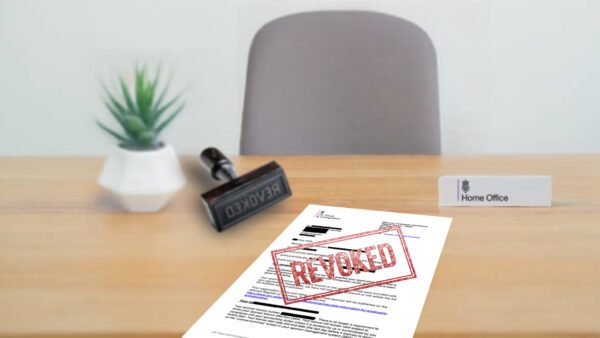Latest Posts

Expiry of a Lease Protected Under the Landlord and Tenant Act 1954: Options and Strategic Considerations
Under the Landlord and Tenant Act 1954 (the Act), commercial tenants occupying a property for their business purposes enjoy a security of tenure (provided that the qualifying criteria is met), meaning their tenancy does not automatically end on the expiry of the contractual term unless those rights were properly excluded before the lease was granted using the prescribed process.
A protected tenancy continues after the expiry date on the same terms until terminated in accordance with the Act or until a new lease is agreed.
Options for Landlords and Tenants Upon Lease Expiry
1. Termination Without Renewal
Landlord’s Section 25 Notice: A landlord can serve a Section 25 notice to either propose new lease terms (see below) or oppose a renewal. If opposing the renewal, they must rely on one of the limited statutory grounds Section 30(1), such as:
- Tenant’s breach of lease terms or disrepair.
- Persistent rent payment delays.
- Availability of suitable alternative accommodation.
- Landlord’s intention to redevelop or occupy the property.
Certain grounds (e.g., redevelopment) may entitle the tenant to compensation.
Forfeiture: The Act does not prevent a landlord from forfeiting the lease if allowed by the lease terms and in accordance with those terms, provided that the correct process is followed.
2. Renewal of the Lease
Landlord’s Section 25 Notice: The landlord can propose terms for a new lease via a Section 25 notice. Usually parties will negotiate and agree new terms. If however the parties cannot agree, either can apply the court to determine the terms, at any time after the notice has been served.
Tenant’s Section 26 Request: A tenant may serve a Section 26 request to initiate renewal and propose new terms. If the landlord intends to oppose this, they must respond with a counter-notice within two months. Failing to do so forfeits their right to object. Where a s26 request has been served, the court application cannot be made for 2 months (unless a counter notice is served).
New Lease Terms Considerations
Rent: New rent should reflect open market value.
Continuity of Terms: New leases generally should mirror existing terms unless changes are negotiated or deemed reasonable.
Deadlines: Both parties must meet various strict deadlines set by the respective notice or request otherwise they may lose their right either to object to a new lease or request a new lease.
Strategic Considerations for Serving Notices or Requests
For Landlords:
Control Over Termination Date: Serving a Section 25 notice allows landlords to set the termination timeline and ensure that the lease is terminated and a new lease granted as soon as possible after the lease expiry date without an interim period where the previous lease continues. Also means a Court application can be made sooner if it is clear that terms are not going to be agreed directly.
Proposing Favourable Terms: A Section 25 notice enables landlords to start negotiations with terms favourable to them, putting the tenant on the defensive and thus creating a bigger onus to justify any counter-proposals.
Opposing Renewal: If the Landlord opposes a renewal, it should serve a Section 25 notice to protect its position before a renewal request is served by the Tenant, ensuring that this is progressed as quickly as possible.
For Tenants:
Control Over Lease Start Date and Timings: A Section 26 request allows tenants to gain more control over timing by proposing a new lease start date, which must be at least six months from the notice date and not before the contractual expiry date. It can also prevent the Landlord making a court application for a 2-month period, potentially encouraging negotiations.
Pre-empting Landlord Proposals: By serving a Section 26 request, tenants can pre-empt unfavourable terms in a potential Section 25 notice, such as higher rent or opposition to renewal, and set the tone for negotiations.
Importance of Seeking Legal Advice
The procedural requirements under the LTA 1954 are strict, and failure to comply with deadlines or notice requirements can mean losing rights to renew or oppose renewal. Strategic planning can significantly influence negotiation outcomes and the terms of any new lease.
Given the potential financial and commercial stakes at risk, legal guidance from experts in this field is essential to ensure your position is secured. Whether you are a landlord or tenant, if your lease is nearing expiry, get in touch with our experts in our commercial property team to discuss your position and receive tailored expert advice based on your commercial requirements.
Read More
Court of Appeal Confirms No Obligation for Home Office to Conduct Impact Assessments Before Revoking Sponsor Licences
The Court of Appeal has recently confirmed in R (on the application of Leeds City College) v Secretary of State for the Home Department [2024] EWCA Civ 123 that the Home Office is not legally required to carry out an impact assessment before revoking a sponsor licence. This decision has significant implications for UK businesses and organisations reliant on sponsored workers, particularly in sectors facing acute labour shortages.
Legal Analysis: Implications of the Ruling
The ruling reinforces the discretionary powers of the Home Office when managing sponsor licences. While a judicial review remains an option for businesses facing adverse decisions, the threshold for successfully challenging a revocation remains high. The courts have consistently deferred to the Home Office’s powers in enforcing immigration control, particularly where allegations of non-compliance exist.
This strict approach highlights the principle that holding a sponsor licence is a privilege rather than a right. Businesses must therefore approach their duties with diligence, ensuring they maintain accurate records, comply with all reporting obligations, and promptly address any compliance risks to avoid penalties or revocation.
Compliance and Risk Management
Given the Home Office’s stringent enforcement regime, businesses should consider the following proactive measures:
- Regular Compliance Audits: Conduct internal reviews to identify and rectify any gaps in compliance.
- Staff Training: Ensure HR and compliance teams are well-versed in sponsor duties and reporting obligations.
- Legal Review: Engage immigration legal experts to assess risk exposure and provide guidance on maintaining best practices.
A failure to uphold compliance obligations can not only lead to licence revocation but may also impact an organisation’s ability to recruit international talent in the future.
Broader Policy Context and Sectoral Impact
The ruling also comes amidst broader discussions about the UK’s immigration policies. Recent reports from the National Audit Office (NAO) suggest that the Home Office lacks a full understanding of how the skilled worker visa route is used and its economic impact. The frequent changes to the Skilled Worker visa rules—such as the 2022 expansion to include care workers and the subsequent tightening of eligibility criteria in 2024—demonstrate the unpredictable nature of immigration policy in the UK.
A lack of impact assessments in the revocation process means that entire industries, particularly those reliant on international talent, may face disruptions with little recourse. The case of AG Recruitment, whose licence was revoked after concerns about foreign workers incurring large debts to unregulated brokers, underscores the broader consequences of such decisions.
Other sources, such as think tank reports and parliamentary briefings, have raised concerns over the Home Office’s policy approach, suggesting that greater transparency and oversight could benefit businesses and workers alike.
How Quastels LLP Can Assist
At Quastels LLP, we specialise in immigration law and sponsor compliance, offering tailored solutions for businesses navigating the complexities of UK immigration regulations. Our services include:
- Sponsor Licence Compliance Audits: Helping businesses mitigate risks and ensure full compliance.
- Legal Representation: Assisting with challenges to licence suspensions or revocations.
- Strategic Immigration Advice: Guiding businesses on best practices for hiring and retaining international talent.
If your business holds a sponsor licence or is at risk of enforcement action, contact our team today for expert legal advice and strategic support.
Read More
Sponsor Licence Revocation: Immediate Steps to Protect Your Business
Holding a Sponsor Licence is a significant responsibility for UK businesses employing skilled workers from overseas. The Home Office imposes strict compliance requirements on sponsors, and failure to meet these obligations can result in sponsor licence revocation. This can have severe consequences, including the loss of a business’s ability to employ migrant workers, reputational damage, and, in some cases, financial penalties.
If your sponsor licence is at risk of revocation- or has already been revoked- it is essential to act immediately to mitigate the impact on your business and your sponsored employees. At Quastels, we provide urgent legal assistance to businesses facing compliance investigations and sponsor licence revocation, helping them protect their workforce and maintain their operations.
Understanding Sponsor Licence Revocation
A sponsor licence may be revoked when the Home Office determines that a business has failed to meet its compliance obligations. Unlike suspension, which allows a business time to correct compliance issues, revocation is final, and there is no right of appeal. This means that businesses must take proactive steps to prevent revocation and, where necessary, challenge the decision through alternative legal remedies.
Common Reasons for Sponsor Licence Revocation
The Home Office may revoke a sponsor licence for several reasons: including:
1. Non-Compliance with Sponsor Duties
Sponsors are required to maintain rigorous compliance standards, including:
- Keeping accurate records of employee work status and right to work documents
- Reporting relevant changes in sponsored employees’ circumstances
- Ensuring that sponsored workers meet the requirements of their visa category
Failure to meet these obligations can lead to revocation.
2. Failure to Pass a Home Office Compliance Audit
The Home Office conducts unannounced audits to assess whether businesses are meeting their sponsorship duties. A failed audit- due to poor record-keeping, an inability to provide required documentation, or a lack of proper HR systems- can result in immediate revocation.
3. Employing Workers Without the Right to Work
Hiring employees who do not have legal permission to work in the UK can lead to civil penalties, reputational damage, and the revocation of a sponsor licence.
4. Abuse of the Sponsorship System
If the Home Office determines that a business is using its sponsor licence for fraudulent purposes- such assigning Certificates of Sponsorship (CoS) to non-genuine workers- the licence can be revoked immediately.
5. Salary or Job Role Non-Compliance
Sponsored employees must be paid the minimum salary set out in their visa requirements and must be working in the role specified in their CoS. Any deviation from these requirements without proper notification to the Home Office may result in revocation.
Immediate Steps to Take After Sponsor Licence Revocation
If your sponsor licence has been revoked, immediate action is necessary to protect your business and employees. The following steps can help mitigate the impact:
1. Assess the Grounds for Revocation
The Home Office will issue a revocation letter detailing the reasons for its decision. It is crucial to carefully review this letter to understand the specific compliance breaches identified.
2. Seek Urgent Legal Advice
Given that the sponsor licence is final with no right of appeal, it is essential to seek expert legal assistance immediately. At Quastels, we assess the strength of your case and advise on the most appropriate course of action, including:
- Judicial Review- If the revocation was unlawful or procedurally unfair, it may be possible to challenge the decision through a Judicial Review in the High Court.
- Fresh Sponsor Licence Application- In some cases, it may be possible to reapply for a sponsor licence after addressing compliance issues.
3. Communicate with Affected Employees
Once a licence is revoked, all sponsored employees lose their right to work in the UK and must either:
- Find a new sponsor within 60 days, or
- Leave the UK at the end of their visa curtailment period
Employers should communicate openly with affected employees and provide support in exploring alternative options.
4. Conduct an Internal Compliance Review
If there is an opportunity to challenge the decision or reapply in the future, it is essential to address the issues raised by the Home Office. This may involve:
- Implementing improved HR systems and compliance procedures
- conducting internal audits to ensure proper record-keeping
- Training staff on sponsorship compliance obligations
Can a Sponsor Licence Be Reinstated?
While there is no direct right of appeal against revocation, businesses may explore the following options:
- Judicial Review- If the revocation was unlawful or based on incorrect evidence, a challenge may be brought in the courts. Judicial Review is a complex legal process, but in cases where the Home Office has made errors, it can result in the decision being overturned.
- Fresh Sponsor Licence Application- If the business can demonstrate that is has addressed previous compliance issues, it may be possible to submit a new sponsor licence application. However, this is generally not permitted for at least 12 months after revocation, unless there are exceptional circumstances.
Preventing Sponsor Licence Revocation
Prevention is always better than remedy. Businesses should adopt a proactive approach to compliance to minimise the risk of licence revocation. Key best practices include:
1. Conduct Regular Compliance Audits
Regular internal audits can help identify potential compliance issues before they become serious problems. This includes ensuring that all employee records are up to date and that reporting duties are being met.
2. Maintain Robust HR Systems
A well-organised HR system is critical for tracking sponsored employees’ visa statuses, work conditions, and reporting obligations. Digital compliance tracking can help businesses manage this more effectively.
3. Prepare for Unannounced Home Office Audits
The Home Office has the authority to conduct unannounced compliance visits. Businesses should ensure they are always audit-ready by maintaining complete and accessible records.
4. Ensure Employees Are Aware of Compliance Obligations
HR teams and line managers should be trained in sponsor licence compliance requirements to ensure the business is fully aligned with Home Office regulations.
How Quastels Can Assist
At Quastels, we provide specialist legal support to businesses facing sponsor licence revocation. Our services include:
- Urgent legal representation for businesses challenging revocation decisions
- Judicial Review applications in cases of unlawful Home Office decisions
- Sponsor Licence compliance audits to prevent future issues
- Strategic advice on reapplying for a licence after revocation
Our team has extensive experience in navigating the complexities of UK business immigration law, ensuring that our clients remain compliant and protected from enforcement actions.
Conclusion
Sponsor licence revocation is a serious issue that can significantly disrupt a business’s operations and workforce. Given the lack of a formal appeal process, businesses must act quickly to assess their options, seek legal advice, and take corrective measures.
At Quastels, we provide immediate assistance to businesses facing revocation, helping them protect their workforce, challenge unfair decisions, and implement compliance solutions to prevent future issues.
If your sponsor licence has been revoked- or if you are concerned about compliance risks- contact us today for expert legal support.
Read More